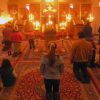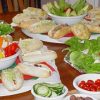Some Non-Orthodox Christians tend to read more into the Holy Bible than is really there; they want the Bible to be the perfect solution to all of life’s problems. On the other extreme are non-Christians who advocate the Bible is less than what the Church teaches; they continually look for faults in the Bible and disregard its precepts. To arrive at a more balanced view, what follows is an apophatic explanation of what the Bible is not according to the Traditional teachings of the Orthodox Church. Orthodoxy has a long apophatic theological tradition of describing what God is not so that we don’t foolishly limit God’s being and behavior into mere human conceptions. Likewise, the Holy Bible is not. . .
- A History Book. Though the Bible covers thousands of years of history, the Bible is not meant to merely be a record of ancient Israel and the early Church. Those who wrote the Bible’s contents were not historians but apostles, prophets, and religious leaders more concerned about teaching spiritual truths than presenting historical facts. The Bible’s history provides a context that helps illustrate spiritual truths and the gradual unfolding of God’s plan of salvation.
- A Fictional Novel. On the other side of the coin, the Bible is not a fictional account either. The writers were not intentionally making up facts to mislead people into becoming Jewish or Christian. There is a lot of archeological evidence supporting much of what is recorded in the Bible. However, there is no claim within the Orthodox Church that every single account within the Bible is 100% historically accurate. Again, the stories were primarily told to illustrate spiritual truths.
- A Science Textbook. The Bible is not primarily meant to teach geography, anthropology, psychology, medicine, or other scientific information. When the Bible touches on those subjects, it does so based on the limited human knowledge the writers of those time periods had. Though the Bible advocates for certain practices, it does so as befits what people needed in order to thrive within a particular social context or what is needed at anytime to morally please God.
- An Inerrant Composition. The Bible is remarkably consistent in its teaching of spiritual doctrines and moral principles. The Bible is a reliable testimony of who God is and what God wants, but that is not to claim everything within its pages are “inerrant” (completely without error). Though inspired by God, fallible human beings scribed and translated the text. The Orthodox Church teaches the Bible expresses more than what is merely human but less than what is fully divine.
- A Personal Oracle. The Bible is not a magic book where one can ask a question, randomly flip the Bible open, drop a finger, and get God’s answer. Such practice is known as “Bibliomancy” and is not an endorsed practice by the Orthodox Church. The Bible offers God commanded solutions to social-moral dilemmas, and it offers knowledge toward how to walk righteously and find salvation, but the Bible doesn’t have an answer to every possible life problem.
- A Philosophical Treatise. The Bible is not meant to be read as if it is merely a humanistic, philosophical discourse on how to understand life and better one’s self. Rather, the Bible reveals its blessings spiritually rather than intellectually, if the reader approaches the Bible spiritually. In other words, the Bible imparts the fullness of its truth, goodness, and beauty only within the Church and having a relationship with the Triune God—Father, Son, and Holy Spirit.
- A Civil Constitution. The Bible is not meant to dictate how societies should rule themselves. Though it contains moral principles that would be beneficial for anyone to follow, including the leaders of government, the Bible should not be used to determine political allegiance nor be used to back politically motivated agendas. The Orthodox Tradition teaches that positive societal change occurs within the Church as believers mature in the kingdom of God.
- A Self-Help Guide. The Bible is not intended to be studied apart from the guidance and authority of the Church. God does not intend we be “Lone Ranger Christians” gleaning insights from the Bible without the checks and balances found from the Orthodox Church’s oversight and Traditional doctrinal teachings. It is fairly easy, and all too common, to individually misinterpret the Bible and fall into heresy or divide the Church by starting one’s own denomination.
- An Exhaustive Resource. Though the Bible is an essential book, though it’s chief among all Christian books, it’s not all you need; it’s not the only book beneficial to being a Christian and growing in Christ. The Orthodox Church encourages Her members to not only study the Bible but to also read the writings of the Holy Fathers and Mothers of our Tradition—whether through their books, collected sayings, liturgical hymns, or their Ecumenical Council decisions.
- A Divine Biography. The Bible is not God, does not describe the totality of God, and is not the only place one encounters God. To think these ways is “Biblio-idolatry.” Unfortunately, some Christians spend more time studying their Bible and learning about God than directly communing with God via worship and prayer. Yet also wrong, there are those who worship and pray without sufficiently knowing Whom they are worshiping and praying to nor why.
The above ten things are not all that can be said, or not said, about the Bible. For two millennia, the Bible has defied attempts to categorize it. The Bible is truly a book unique among the billions of tomes published around the world. The best way to grasp what the Bible is, or is not, is by reading it, contemplating it, asking questions of your priest or other Orthodox spiritual leader about it, and then read it some more. The Bible will continually astound you with its spiritual and moral insights about God and humanity for a lifetime.
There is no such thing as “knowing everything you need to know” when it comes to the Bible. Those who believe they learned everything about the Bible from children’s Sunday school, or from a catechism class, are fooling themselves. Even professors and scholars of the Bible, who are frequently drinking from the Bible’s well, never completely have their thirst quenched and so must return to it again and again. So please regularly study the Scriptures yourself, as did King Solomon, so you may become wise. “God loves nothing as much as the one who lives with wisdom” (Wisdom of Solomon 7:28, OSB).

















